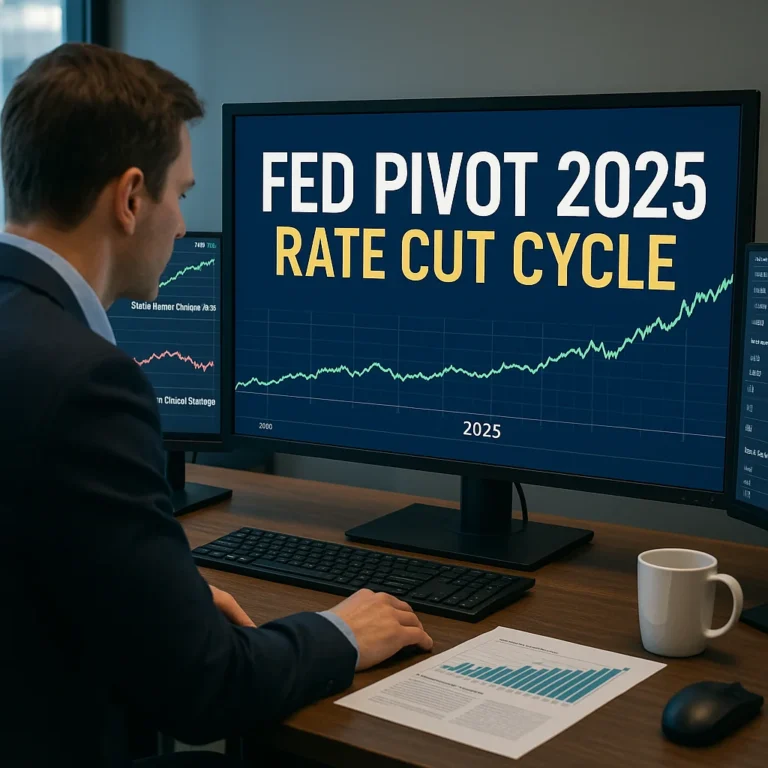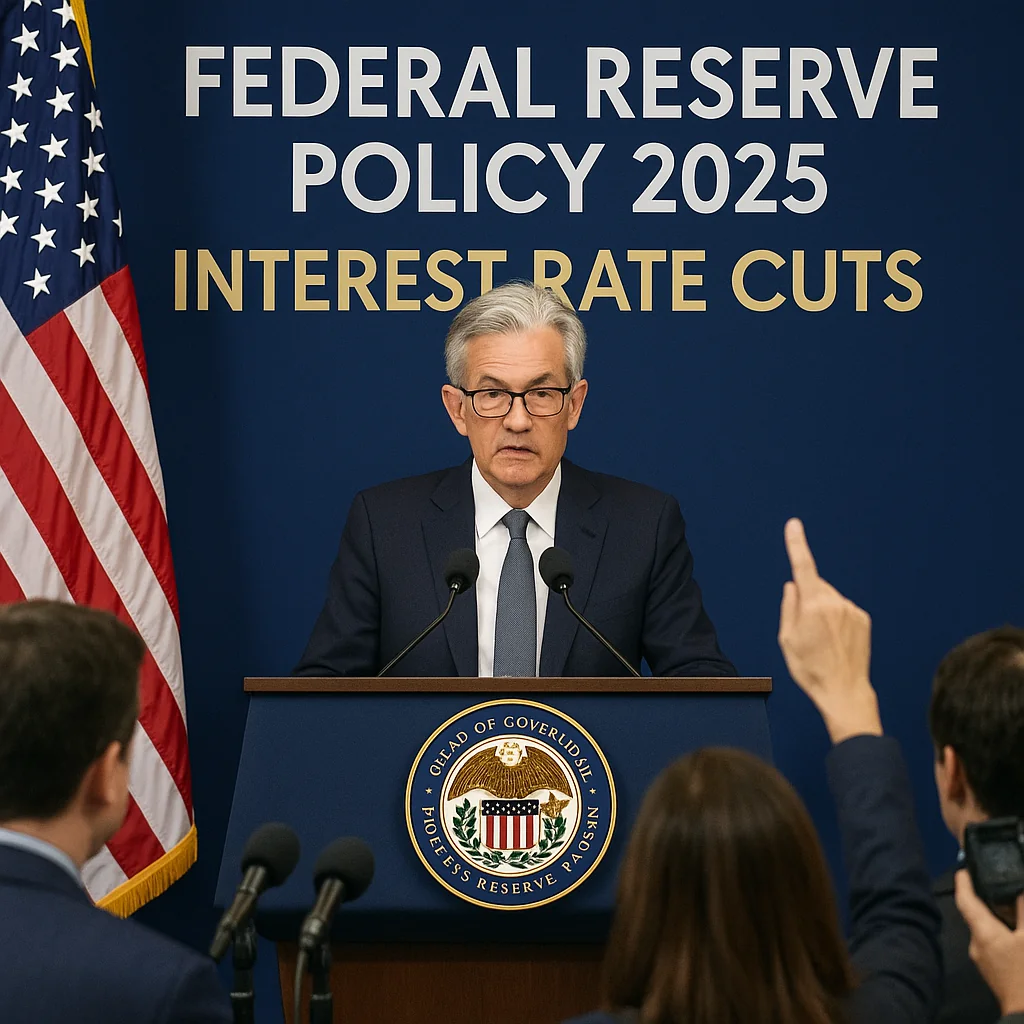
Fed Pivot 2025: What a Rate Cut Cycle Could Mean for the Markets
Updated: October 23, 2025 · Reading time: 8–10 minutes
The fed pivot 2025 rate cut cycle could reshape positioning across equities, bonds, and metals. As investors track interest rate cuts 2025 within evolving federal reserve policy 2025, the near-term path for liquidity, risk appetite, and an effective inflation control strategy will drive the stock market outlook 2025. Below are the key dynamics to watch before the first cut.
🔑 Key Points Quick Take
- Cut cadence & terminal rate: Markets will price not just the first cut, but the pace and the new neutral rate.
- Yield curve & liquidity: Easing typically steepens curves and supports multiple expansion in growth sectors.
- Sector playbook: Tech/growth often lead on lower discount rates; financials and cyclicals follow as activity improves.
- Inflation path: A credible inflation control strategy is crucial—too fast a cut risks reflation; too slow risks hard-landing odds.
- Positioning & risk: Expect volatility around Fed communications, jobs prints, and CPI/PCE surprises.
Next: a data-driven market overview—how prior pivot cycles affected the S&P 500, NASDAQ, and the 10-year Treasury—and what today’s setup implies.
Market Overview: Reading a Fed Pivot Through Yields, Liquidity, and Earnings
When a fed pivot 2025 rate cut cycle begins, markets usually price three things at once: the pace of interest rate cuts 2025, the new terminal rate in federal reserve policy 2025, and how an inflation control strategy affects margins and multiples. Historically, equities bottom near the end of a hiking phase while the stock market outlook 2025 hinges on the speed of disinflation and how quickly real yields retreat.
- Yields lead equities: 2Y–10Y move first; curve re-steepening often precedes multiple expansion.
- Liquidity impulse: Slower QT or a friendlier balance-sheet path can amplify risk appetite.
- Earnings vs. discount rates: Lower rates help long-duration tech/growth; cyclicals need activity to re-accelerate.
- Volatility windows: CPI/PCE prints and FOMC days can whipsaw positioning early in the cycle.
Policy & Rates
Track official guidance, statements, and meeting outcomes to refine expectations for the fed pivot 2025 rate cut cycle:
Supplemental Dashboards
Use these for quick pulse-checks; tagged rel="nofollow" per your linking plan:
Strategy pivots to consider now: day trading vs swing trading during regime shifts, position sizing for reversals if you’re shorting in day trading, and potential tailwinds for precious metals amid easing—see silver rally trading strategy signals.
Next: a deeper dive into the 2025 setup—why disinflation, labor normalization, and forward guidance matter for leadership rotation and risk allocation.
Deep Dive: Why 2025 Looks Like a Pivot Window
The setup for a fed pivot 2025 rate cut cycle rests on three overlapping forces: disinflation progress, cooling yet resilient labor data, and tighter credit conditions that have already done some of the Fed’s work. If federal reserve policy 2025 confirms an easing path, markets will re-rate cash flows using a lower discount rate, shaping the stock market outlook 2025. The pace of interest rate cuts 2025 must still preserve an inflation control strategy credible enough to prevent a second inflation wave.
Macro Signals to Watch
- Disinflation: Stabilizing core inflation supports a gradual cut path without reigniting price pressure.
- Labor normalization: Softer hiring with stable unemployment lowers wage-push risk, helping credibility.
- Real yields & term premium: A drift lower typically boosts long-duration growth valuations.
- Credit pulse: Lending standards and delinquency trends inform how quickly easing should arrive.
For official context and briefing calendars, see Federal Reserve press releases, while policy dashboards on MarketWatch and definitions on Investopedia provide supplemental reference.

Positioning & Strategy Implications
A credible inflation control strategy alongside measured easing often favors quality growth and duration-sensitive assets early, while cyclicals improve as activity re-accelerates. Traders weighing breakout momentum versus mean-reversion can revisit day trading vs swing trading frameworks, and stress-test short setups during regime change with what is shorting in day trading. For metal hedges tied to real-rate trends, see silver rally trading strategy signals.
Next: Live look at growth leadership versus real yields—how the NASDAQ and the 10-year Treasury react when policy shifts.
Deep Dive: Growth Leadership, Real Yields, and the Second-Leg Risk
In a fed pivot 2025 rate cut cycle, the interplay between equity duration and real yields often decides leadership. If real yields drift lower ahead of interest rate cuts 2025, growth and quality factors tend to re-rate first. But the stock market outlook 2025 still hinges on earnings durability and a credible inflation control strategy within the broader federal reserve policy 2025 path. Watch how the 10-year Treasury reacts around key CPI/PCE and FOMC events.
Playbook: Falling Real Yields
- Multiple expansion: Lower discount rates favor long-duration tech/growth.
- Quality bias: Positive free cash flow and earnings visibility outrun highly levered names.
- Curve re-steepen: Early signal that credit conditions may ease into 2025.
Risks: Sticky Inflation or Growth Scare
- Stop-start cuts: Inflation surprises can slow the cadence of easing.
- Earnings gap: If activity cools too quickly, margins compress despite lower rates.
- Policy credibility: A wobbly inflation control strategy can reprice yields and volatility.
Track official signals and market pricing: Federal Reserve Press Releases, Bloomberg – Interest Rates, Reuters – Economy, CNBC – Economy. Supplemental dashboards: Yahoo Finance – Central Banks, MarketWatch – Fed Tools, Investopedia.
Revisit position frameworks in day trading vs swing trading, stress-test shorts with what is shorting in day trading, and consider metals sensitivity to real rates via silver rally trading strategy signals.
Insights & Forecast: Portfolio Tilts for a 2025 Cut Cycle
With a potential fed pivot 2025 rate cut cycle, we map three scenarios—early, baseline, and delayed interest rate cuts 2025. Each path influences the stock market outlook 2025, sector leadership, and how a credible inflation control strategy fits into broader federal reserve policy 2025.
| Scenario | Rate Path | Market Lean | Risks |
|---|---|---|---|
| Early Cuts (dovish surprise) | Faster easing; balance-sheet tone softens | Growth/quality lead; multiple expansion; long duration | Reflation scare if growth re-accelerates too quickly |
| Baseline (well-telegraphed) | Gradual cuts; data-dependent cadence | Balanced: growth first, cyclicals follow as activity firms | Earnings disappointments; curve steepens then stalls |
| Delayed (sticky inflation) | Cuts pushed out; higher-for-longer messaging | Defensive tilt; barbell quality + cash/yield; commodities mix | Growth scare; volatility around CPI/PCE and FOMC |
Actionable Playbook
- Sequencing: Real yields usually turn first; watch curve re-steepening for risk appetite signals.
- Quality bias: Favor free-cash-flow leaders while earnings visibility normalizes.
- Barbell option: Pair duration-sensitive growth with selective cyclicals as activity improves.
- Metals hedge: If real rates fade, precious metals can benefit—review silver rally trading strategy signals.
- Trading regimes: Volatility clusters around policy days—compare day trading vs swing trading and stress-test short setups via what is shorting in day trading.

Track evolving guidance and market pricing: Federal Reserve Press Releases, Bloomberg – Interest Rates, Reuters – Economy, CNBC – Economy. Dashboards: Yahoo Finance Central Banks, MarketWatch Fed Policy, Investopedia.
Next: FAQs and wrap-up—key definitions, timelines, and how to position ahead of policy inflection points.
FAQs: Fed Pivot 2025 & What It Means
What is a “Fed pivot” and why could 2025 matter?
A Fed pivot is the shift from hiking to easing. In 2025, the fed pivot 2025 rate cut cycle would mark a turn toward looser financial conditions, affecting discount rates, earnings multiples, and the stock market outlook 2025.
How do interest rate cuts affect inflation?
Cuts boost liquidity and growth but risk reflation. A credible inflation control strategy aims to ease policy without reigniting price pressures—central to federal reserve policy 2025.
Which sectors often benefit first after cuts begin?
Duration-sensitive areas—quality tech and growth—can re-rate first as real yields fall. Cyclicals often follow as activity improves.
How long after a cut cycle before markets recover sustainably?
Timing varies by earnings, inflation, and credit conditions. Historically, equities tend to bottom around late-hike/early-cut phases, but sustained gains require earnings follow-through.
How should traders adapt day trading vs. swing trading during a pivot?
Expect event-driven volatility (CPI/PCE, FOMC). Clarify time frames and risk. Compare day trading vs swing trading, stress-test shorts with what is shorting in day trading, and watch real-rate trends for metals via silver rally trading strategy signals.
Conclusion: A Playbook for the Next Policy Turn
The early phase of a fed pivot 2025 rate cut cycle is often volatile but opportunity-rich. Align exposures with the evolving path of interest rate cuts 2025, keep federal reserve policy 2025 on your dashboard, and insist on an inflation control strategy that balances growth with price stability. Focus on quality balance sheets, disciplined risk, and clear entries/exits tied to data catalysts.

Pauline Lei
Market Analyst · Lead WriterPauline covers policy shifts, cross-asset flows, and trader playbooks for TradeStockAlerts.com. In this piece on the fed pivot 2025 rate cut cycle, she connects rate path scenarios to positioning across equities, yields, and metals—so readers can align entries, trims, and hedges with data catalysts.